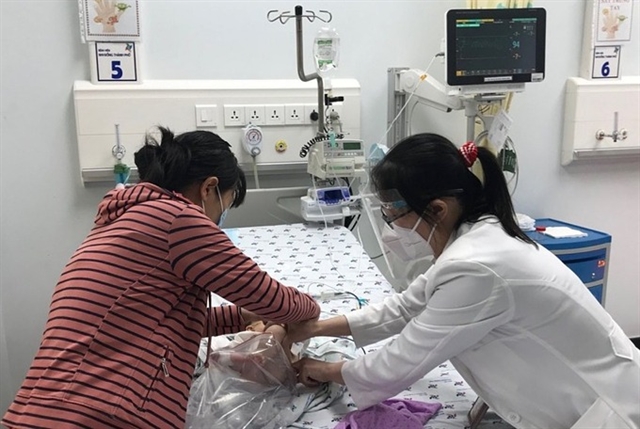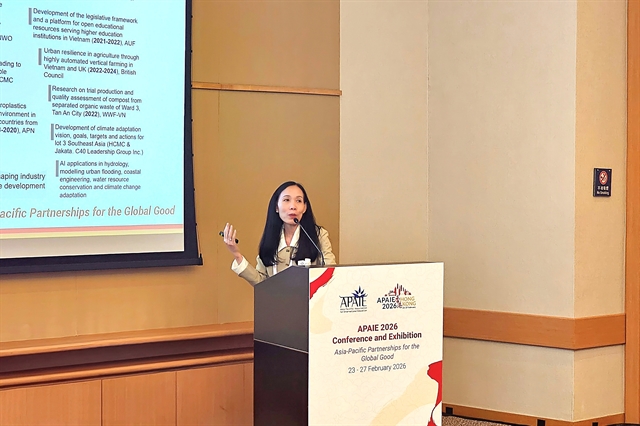 Society
Society

Children who have a fever for two straight days and other early symptoms of dengue fever should visit doctors as soon as possible to prevent complicated development of the disease, especially when the rainy season is coming, which can worsen dengue fever outbreaks.

|
| A newborn baby with dengue fever is treated at HCM City Children's Hospital. — Photo suckhoedoisong.vn |
HÀ NỘI — Children who have a fever for two straight days and other early symptoms of dengue fever should visit doctors as soon as possible to prevent complicated development of the disease, especially when the rainy season is coming, which can worsen dengue fever outbreaks.
Doctors also raised concerns that due to fears of COVID-19 infections, many people have been delaying visits to doctors.
According to the Centre for Children’s Tropical Diseases under the Hà Nội-based National Children’s Hospital, in the last two months, the centre received more than 60 children with dengue fever. Among them, the youngest was only six days old.
A mother named Trang whose son was treated at the hospital for ten days said that he had a high temperature of up to 41 degrees Celsius and vomited a few times a day.
Trang said that she gave her son pain relief tablets for a few days but they did not work and he continued to have a fever.
“I took my son to a local hospital – Chương Mỹ District’s Hospital – and then he was transferred to the National Children’s Hospital after a diagnosis of dengue fever,” she said, adding that her daughter and father also had the fever.
From the beginning of this year, Hà Nội reported more than 540 dengue fever cases in 27 out of its 30 districts and towns.
In HCM City, the city’s Children Hospital received a two-year-old boy with complications of dengue fever.
The two-year-old boy from the southern province of Tây Ninh had breathing difficulties and a bloated stomach.
Doctors determined the leakage of water in the blood vessels caused his abdomen to swell, putting pressure on the lungs. The lungs, which were already filled with effusion, lacked more space for gas exchange.
After four days of intensive treatment, the child partly recovered but still needed intensive care and blood transfusion.
Tâm Anh General Hospital in HCM City also received an increasing number of child patients with dengue, aged mostly from three to seven years old.
According to the hospital’s Department of Pediatrics, many of the children were taken to the hospital after having a high temperature for several days.
Some even suffered serious complications due to their late visits to doctors.
Head of the hospital’s Department of Pediatrics Lê Phan Kim Hoa said that the number of dengue fever cases could increase as the southern region entered the rainy season which lasts until early next year.
The peak time for dengue fever outbreaks might fall in the last few months of this year, she said.
“Due to the COVID-19 pandemic, many are hesitating to go to the hospital for medical examination and treatment,” she said.
“Delaying medical visits could worsen the patients' conditions, even raising the risk of death,” Thoa said.
If children suffer a continuous fever for at least two days, parents should take them to a doctor, Thoa said.
It was necessary to take the children to the hospital at once when they had symptoms like irritability, lethargy, poor appetite, vomiting, abdominal pain, nosebleeds, blood in the teeth or vomiting blood and black stools, Thoa said.
In the early stages of illness, children often have symptoms that are easily confused with other viral infections like typhus or hand–foot–mouth disease. However, dengue fever is different from other viral diseases as after four or six days, children’s fever can get better or disappear, but their illness is still severe.
Thoa said that children need to be diagnosed early to have a suitable monitoring and treatment regimen.
“The fever ending does not mean the children have recovered from the disease. When dengue is severe, bleeding or plasma leakage can cause shock. Without adequate rehydration or uncontrolled bleeding and anaemia, the disease can seriously affect internal organs,” the doctor said.
Associate Professor Đỗ Duy Cường, Director of the Center for Tropical Diseases under Bạch Mai Hospital, said that dengue fever and COVID-19 both had some similar initial symptoms including high fever, headache and tiredness. However, COVID-19 is spread through inhalation, contact with droplets/surfaces containing virus droplets, and dengue is transmitted through blood by mosquitoes.
"As they are worried about the spread of COVID-19, many people with dengue symptoms did not dare to go to the hospital for examination and treatment. This is one of the common mistakes,” he said.
“Most dengue fever patients recover within seven days. However, about 5 per cent of dengue fever patients will have severe manifestations such as bleeding or plasma leakage. Without timely treatment, the patient will face fatal risks," Cường said.
According to the Ministry of Health, nearly 44,000 dengue fever cases and 13 deaths relating to the disease were reported in Việt Nam in the first eight months of this year.
The number of dengue fever cases decreased 9.35 per cent compared to that of the same period last year, however, the number of deaths rose by ten. — VNS




